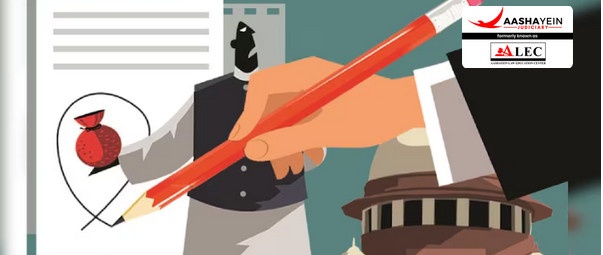Introduction:
In a significant judgment that revisits and redefines the scope of legislative immunity granted under Article 105(2) and Article 194(2) of the Constitution of India. The Supreme Court, in a seven-judge bench, reviewed the earlier decision in P.V. Narsimha Rao v. Union of India (1998) and clarified whether a legislator enjoys immunity for accepting bribes to vote in Parliament or a State Assembly. This judgment has broader implications for the functioning of democracy, particularly in addressing corruption within the legislative framework.
Facts:
An election was held to elect two members of the Rajya Sabha. Sita Soren, a member of the Jharkhand Mukti Morcha, was accused of accepting a bribe from an independent candidate in exchange for her vote. However, since the Rajya Sabha follows an open balloting system, it was found that Soren voted for a member of her party instead of the candidate from whom she allegedly accepted the bribe. Despite this, the criminal proceedings were initiated against her.
Sita Soren challenged the charges by filing a petition in the High Court, seeking to quash the chargesheet and criminal proceedings. The High Court refused to quash the proceedings, citing the ruling in P.V. Narsimha Rao v. Union of India (1998), which established that a legislator’s immunity under Articles 105 and 194 precludes criminal prosecution for bribery in some cases. Subsequently, a five-judge bench of the Supreme Court doubted the correctness of the P.V. Narsimha Rao decision and referred the matter to a larger bench for re-examination.
You can also read the Blog by visiting [Blog]
For more information, visit [Aashayein Enquiry Section]
Issues:
- What is the extent of immunity granted to legislators under Article 105(2) and Article 194(2) of the Constitution of India?
- Does a legislator enjoy immunity for accepting bribes to vote in Parliament or the State Assembly?
Contentions of the Petitioner:
Sita Soren contended that as a legislator, she enjoyed immunity under Articles 105(2) and 194(2) of the Constitution, which protect her from prosecution related to actions taken in the course of legislative functions. She argued that her actions, even if involving bribery, should not be subjected to criminal prosecution since they were connected to her duties as a legislator. She further relied on the previous judgment in P.V. Narsimha Rao (1998), which shielded legislators from criminal prosecution related to bribery when they voted in line with the bribe, even if the bribe itself was accepted.
Contentions of the Respondent:
The Union of India argued that bribery and corruption by legislators undermine the sanctity of democratic institutions and the constitutional principle of probity in public life. They contended that bribery is an offense that corrupts the functioning of the legislature, and no immunity should protect legislators from criminal prosecution in cases involving bribery. The respondent emphasized that Articles 105(2) and 194(2) protect only the free and fair functioning of the legislature, and not actions that involve criminal behavior such as accepting bribes to influence votes.
Court's Analysis:
The Court clarified that the principle of Stare Decisis, while generally followed, is not an inflexible rule, and larger benches can reconsider previous decisions.
The Court emphasized that claims to privilege must be reviewed in light of constitutional values, particularly when they involve criminal behavior like bribery.
The Court established that any claim to legislative immunity must meet two criteria:
-
- It must relate to the collective functioning of the House.
- It must be essential to the discharge of the legislator's duties. The Court held that bribery, even if not directly influencing the vote, is not protected by these immunities because it undermines the democratic process and the integrity of legislative work.
The Court further held that bribery is an offense that erodes public trust and does not fall within the scope of immunity granted by Articles 105 and 194. The Court rejected the paradox created by the P.V. Narsimha Rao decision, where accepting a bribe was not prosecutable unless the vote was cast as agreed. The Court clarified that the offense of bribery is complete when the bribe is accepted, regardless of whether the legislator votes as promised.
Conclusion:
The Supreme Court in Sita Soren v. Union of India (2024) overturned the controversial ratio established in P.V. Narsimha Rao v. Union of India (1998). The Court concluded that legislators do not enjoy immunity for accepting bribes to vote, as such actions undermine the integrity of the legislative process and the democratic system.

